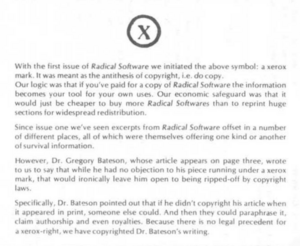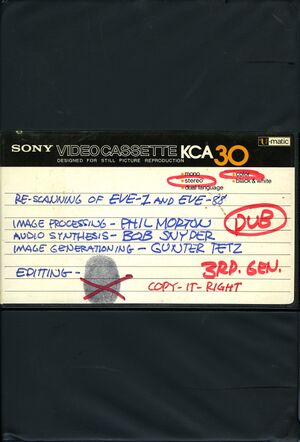Open licenses session
copyright
A copyright is a type of intellectual property that gives the creator of an original work, or another right holder, the exclusive and legally secured right to copy, distribute, adapt, display, and perform a creative work, usually for a limited time.
https://en.wikipedia.org/wiki/Copyright
4 free software freedoms
- The freedom to run the program as you wish, for any purpose (freedom 0).
- The freedom to study how the program works, and change it so it does your computing as you wish (freedom 1). Access to the source code is a precondition for this.
- The freedom to redistribute copies so you can help others (freedom 2).
- The freedom to distribute copies of your modified versions to others (freedom 3). By doing this you can give the whole community a chance to benefit from your changes. Access to the source code is a precondition for this.
https://www.gnu.org/philosophy/free-sw.en.html
licenses as legal + ideological interfaces
https://sound.constantvzw.org/Authors-of-the-future/recordings/5_Aymeric_Mansoux_Free_Only_if.wav (27 min)
Aymeric Mansoux, Free Only If
Presented during Authors of the future: Re-imagining Copyleft, a study day organised by Constant around open license practices in Brussels, September 2019.
See also for a deeeep dive: https://www.bleu255.com/~aymeric/dump/aymeric_mansoux-sandbox_culture_phd_thesis-2017.pdf
The following things are mentioned in Aymeric's presentation and might, we might need to pause when we encounter them for unpacking.
xerox mark
http://www.radicalsoftware.org/e/volume1nr3.html
COPY-IT-RIGHT
Morton developed an approach he called COPY-IT-RIGHT, an anti-copyright approach to making and freely sharing Media art. The Distribution Religion and Morton’s individual and collaborative Media art works were released under his COPY-IT-RIGHT license. COPY-IT-RIGHT encouraged people to make faithful copies, caring for and distributing the work as widely as possible.
GPL
GNU General Public License
https://www.gnu.org/licenses/gpl-3.0.en.html
copyleft
the "viral" element used in some of the open licenses
Creative Commons
the rising ethical storm
Coraline Ada Ehmke on ethical open licenses, presented at CopyleftConf 2020. (27 min)
https://archive.org/details/copyleftconf2020-ehmke
The blog post that Ehmke refers to in her presentation by Bruce Perens, in which he critiques the Hippocratic License: https://perens.com/2019/09/23/sorry-ms-ehmke-the-hippocratic-license-cant-work/
Limits to Openness
An online reading group that has been active in 2023 to explore the “Limits to Openness”, initiated by Femke Snelting and Eva Weinmayr.
“We” is Femke Snelting and Eva Weinmayr –– working on a 2-year project “Ecologies of Dissemination, decolonial knowledge practice, feminist methodology, open access”. From a commitment to sharing and re-use – beyond conventional copyright – we are trying to come to terms with issues of universalism related to the idea of “openness”, as often presented in Open Content, Open Access, Free Culture and so forth. Does Free Culture perversely repeat here the colonial gesture of creating a ground zero for the circulation of knowledge as a “Free” object? What could decolonial, feminist conditions for re-use look like, that would acknowledge entangled notions of authorship?
https://cryptpad.fr/pad/#/2/pad/edit/gVONhpg3GHaXufOn8jAsoRgI/
open license dive
Pick a license from the list on this page, read/discuss for 30 minutes in groups of 2/3: Open licenses



